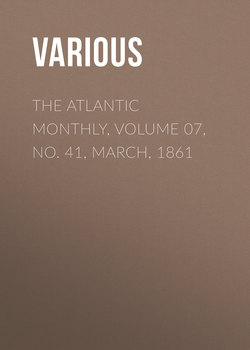The Atlantic Monthly, Volume 07, No. 41, March, 1861

Реклама. ООО «ЛитРес», ИНН: 7719571260.
Оглавление
Various. The Atlantic Monthly, Volume 07, No. 41, March, 1861
GERMAN UNIVERSITIES
THE PROFESSORS
THE STUDIES
THE PROFESSOR'S STORY
CHAPTER XXVIII
GYMNASTICS
LAND-LOCKED
TWO OR THREE TROUBLES
HARBORS OF THE GREAT LAKES
THE MAN WHO NEVER WAS YOUNG
THE MEN OF SCHWYZ
A NOOK OF THE NORTH
BEHIND THE MASK
DIAMONDS AND PEARLS
REVIEWS AND LITERARY NOTICES
RECENT AMERICAN PUBLICATIONS
Отрывок из книги
"Which of the German universities would be the best adapted to my purpose?" is the question of many an American student, who, having gone through the usual course in the United States, looks abroad for the completion of his scientific or liberal studies. Of Göttingen and Heidelberg he will often have read and heard; the reputation of the comparatively new university of Berlin will not be unfamiliar to him; but of Tübingen, Würzburg, Erlangen, Halle, or Bonn, even, he will perhaps know little more than the name. In the majority of the last-named places, foreigners, especially his own countrymen, are rare; none of his friends have studied there; they have followed the current, since the last century, and spent their time in Göttingen or Heidelberg, perhaps a winter in Berlin. They have found these institutions good, and affording every facility for study; but would not Munich, or Leipzig, or Jena, or any other one of the twenty-six universities of Germany, better answer the purpose of many a student?
During the last winter, in many conversations with a retired professor in Berlin, who manifested a special interest in American institutions, mainly in the American educational system, he was very particular in inquiring as to what we meant by our term College. He had read the work of the historian Raumer on America, and declared that from this he could get no notion whatever as to what the term meant with us. The very same thing occurs daily in the United States in regard to foreign, or, more properly, the Continental universities. Accustomed as we are to the prevalence of the tutorial system, the use of text-books,—in many parts of the Union not defining clearly the difference between the terms University, College, Institute, and Academy, giving the first name often to institutions having but one faculty, and that at times incomplete, with no theological, and often no law or medical department, forgetting that the University should, from its very name, be as universal as possible in its teachings, comprehending in its list of studies the combined scientific and literary pursuits of the age,—we are apt to look upon foreign schools of learning as similar in nature and purpose to our own, differing not in the quality or specific character of the teaching, but rather in the scope and extent of the branches taught. Yet nothing is farther from the truth. The result is, that many a one starts for Europe full of hope, to seek what he would have found better at home,—or, when prepared and mature for European travel, is left to chance or one-sided advice in the choice of a locality in which to prosecute further studies. Often with only book-knowledge of the language of the country, accident will lead him to the very university the least adequate to his purpose.
.....
A mean man never agrees to anything without deliberately turning it over, so that he may see its dirty side, and, if he can, sweating the coin he pays for it. If an archangel should offer to save his soul for sixpence, he would try to find a sixpence with a hole in it. A gentleman says yes to a great many things without stopping to think: a shabby fellow is known by his caution in answering questions, for fear of compromising his pocket or himself.
Mr. Silas Peckham looked very grave at the request. The dooties of Miss Darley at the Institoot were important, very important. He paid her large sums of money for her time,—more than she could expect to get in any other institootion for the education of female youth. A deduction from her salary would be necessary, in case she should retire from the sphere of her dooties for a season. He should be put to extra expense, and have to perform additional labors himself. He would consider of the matter. If any arrangement could be made, he would send word to Squire Venner's folks.
.....